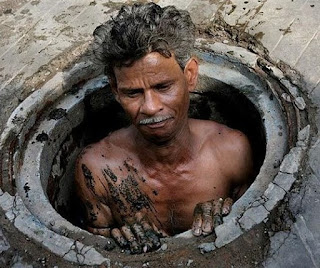(This is the second part of a two-part article. First part can be found here.)
Relevance in
Modern Times
 Dr. Ambedkar refers to caste as an “anti-social
spirit” i.e. the “spirit of protecting
its own interests.” Although the Constitution of India itself does not provide
a definition of ‘caste’ there are just under a hundred references to it in the Constitution.
The Constitution uses the term caste in two senses. Firstly, it is used in the term
“Scheduled Caste,” usually along with ‘Scheduled Tribes‘, ‘weaker sections,‘ or
‘backward classes'. In this sense, caste consists of several groups and tribe. It
includes those who endured social or economical discrimination at for
centuries. These groups or tribes are those for whom certain special provisions
of representation were made due to inter
alia inadequate representation during British administration and to make up
for past social, economical and
political inequalities as well. Secondly, the Consititution uses caste in articles
prohibiting “discrimination on grounds of religion, race, caste, sex” and also,
‘class,’ ‘place of birth,’ ‘language,’ ‘descent,’ and ‘residence.’ In the first
sense, caste is a curative measure to make up for historical inequalities. In second
sense, seeks to bring about equality in society, with its focus on present and
future scenarios, irrespective of the historical inequalities. However, in both
senses, the word ‘caste’ functions, as an anti-social spirit protecting its own
interests.
Dr. Ambedkar refers to caste as an “anti-social
spirit” i.e. the “spirit of protecting
its own interests.” Although the Constitution of India itself does not provide
a definition of ‘caste’ there are just under a hundred references to it in the Constitution.
The Constitution uses the term caste in two senses. Firstly, it is used in the term
“Scheduled Caste,” usually along with ‘Scheduled Tribes‘, ‘weaker sections,‘ or
‘backward classes'. In this sense, caste consists of several groups and tribe. It
includes those who endured social or economical discrimination at for
centuries. These groups or tribes are those for whom certain special provisions
of representation were made due to inter
alia inadequate representation during British administration and to make up
for past social, economical and
political inequalities as well. Secondly, the Consititution uses caste in articles
prohibiting “discrimination on grounds of religion, race, caste, sex” and also,
‘class,’ ‘place of birth,’ ‘language,’ ‘descent,’ and ‘residence.’ In the first
sense, caste is a curative measure to make up for historical inequalities. In second
sense, seeks to bring about equality in society, with its focus on present and
future scenarios, irrespective of the historical inequalities. However, in both
senses, the word ‘caste’ functions, as an anti-social spirit protecting its own
interests.

